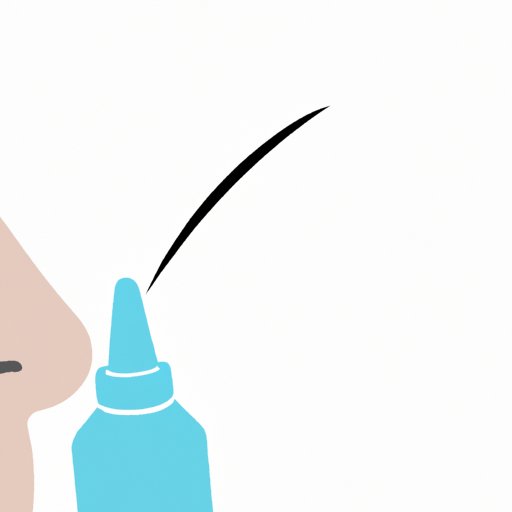
I. Introduction
Do you find yourself wiping your nose frequently due to the constant dripping of clear fluid? You might feel self-conscious about this problem or find it bothersome and uncomfortable. While it’s normal to have a runny nose from time to time, excessive or persistent nose drips can be indicative of an underlying health issue. In this article, we will explore the possible causes of clear nose drips and suggest natural remedies, lifestyle changes, and medications that can help alleviate the symptoms. By the end of this article, you should have a better understanding of how to manage and stop nose dripping clear fluid successfully.
II. Understanding the Causes of Clear Nose Drips
The causes of clear nose drips can vary, from allergies to hormonal imbalances. Allergies, colds, or infections may stimulate the production of excess mucus or lead to inflammation, causing the nose to run. Hormonal changes during pregnancy, menstruation, or menopause can also affect the nasal passages and cause an onset of runny nose. In rare cases, clear nose drips may be caused by cerebrospinal fluid leakage, a condition that requires prompt medical attention.
To identify the root cause of your nose drip, pay attention to any other symptoms you might be experiencing. For example, allergies may cause sneezing, itchy eyes, or throat irritation, while infections may cause fever or sore throat. If your nose drip persists or worsens, it’s best to seek professional medical advice.
III. Natural Remedies for Clear Nose Drips
If you prefer to avoid medication or want to complement medical treatment, natural remedies can provide relief to clear nose drips. For example, inhaling steam can help loosen mucus and ease nasal congestion, especially when you add essential oils such as eucalyptus or peppermint. Another option is to use saline nasal sprays or rinses to hydrate the nasal passages and rinse away irritants or excess mucus. Additionally, using a warm compress over the nose can help alleviate discomfort and reduce inflammation.
When using natural remedies, be sure to follow instructions carefully and avoid using harsh substances that can irritate the nasal passages. Consult with a healthcare provider before using natural remedies if you are pregnant or have underlying health issues.
IV. Diet and Hydration
The food and drinks you consume can affect your immunity, inflammation, and hydration levels, all of which can impact your nose drips. Incorporating fruits and vegetables that are high in antioxidants and nutrients can boost your immunity and reduce inflammation. Foods high in omega-3 fatty acids, such as salmon and nuts, can also improve the health of nasal tissues and reduce inflammation. Drinking plenty of water, herbal tea, or warm fluids can help hydrate the nasal passages and prevent dryness, a potential trigger of nose drips.
V. Removing Irritants
Often, environmental irritants, such as dust, pollen, or pet dander, can trigger nose drips. To remove these irritants, you can take several steps, such as regularly cleaning the house, vacuuming carpets and furniture, and washing bed linens. You can also use air purifiers to filter out the air and reduce the number of irritants, especially during the pollen season. Wearing a face mask when working with chemicals or other irritants can also protect your nose from exposure.
VI. Over-the-Counter Medications
If you’re experiencing discomfort or persistent symptoms, over-the-counter medications can help alleviate the symptoms and reduce the inflammation. Decongestants such as pseudoephedrine or oxymetazoline can shrink the blood vessels in the nose and reduce the swelling. Antihistamines such as loratadine or cetirizine can block the histamines released by the body that cause allergic reactions and sneezing. Corticosteroid nasal sprays can also reduce inflammation and mucus production effectively.
Before taking any medication, read the instructions carefully and consult with a healthcare provider if you have any pre-existing medical conditions or are taking other medications. It’s also important to follow the recommended dosage and not overuse the medication, as it can lead to side effects such as drowsiness, dry mouth, or high blood pressure.
VII. Humidifiers and Air Purifiers
Humidifiers and air purifiers can provide additional support in managing nose drips. A humidifier can add moisture to the air and prevent nasal passages from drying up, a common trigger for nose drips. Make sure to clean the humidifier regularly to avoid mold or bacteria growth. An air purifier can filter out the air and remove irritants, allergens, or pollution that can worsen nose drips, especially during seasons when pollen or dust is high. Keep the air purifier in the bedroom or the living room for maximum effectiveness.
VIII. When to Seek Professional Help
If your nose drip persists for more than two weeks, you experience severe discomfort, or you have other symptoms such as fever or headache, it’s best to seek professional medical advice. A doctor or an ENT specialist can perform an examination, identify the cause of the nose drip, and suggest appropriate treatment. They may recommend antibiotics if the nose drip is caused by an infection or prescribe medication or nasal sprays to alleviate symptoms. In rare cases, they may need to perform a nasal endoscopy or a cerebrospinal fluid test to diagnose cerebrospinal fluid leakage.
IX. Conclusion
In conclusion, nose drips can be a bothersome and uncomfortable problem, but there are various ways to manage and stop them. From natural remedies to over-the-counter medication and lifestyle changes, you can find the best solution that suits your needs. Always consult with a healthcare provider if you have any concerns or persistent symptoms. Remember to stay hydrated, eat a healthy diet, and avoid environmental irritants to prevent nose drips from occurring. With proper care and attention, you can breathe easy and enjoy a nose-drip free life.




